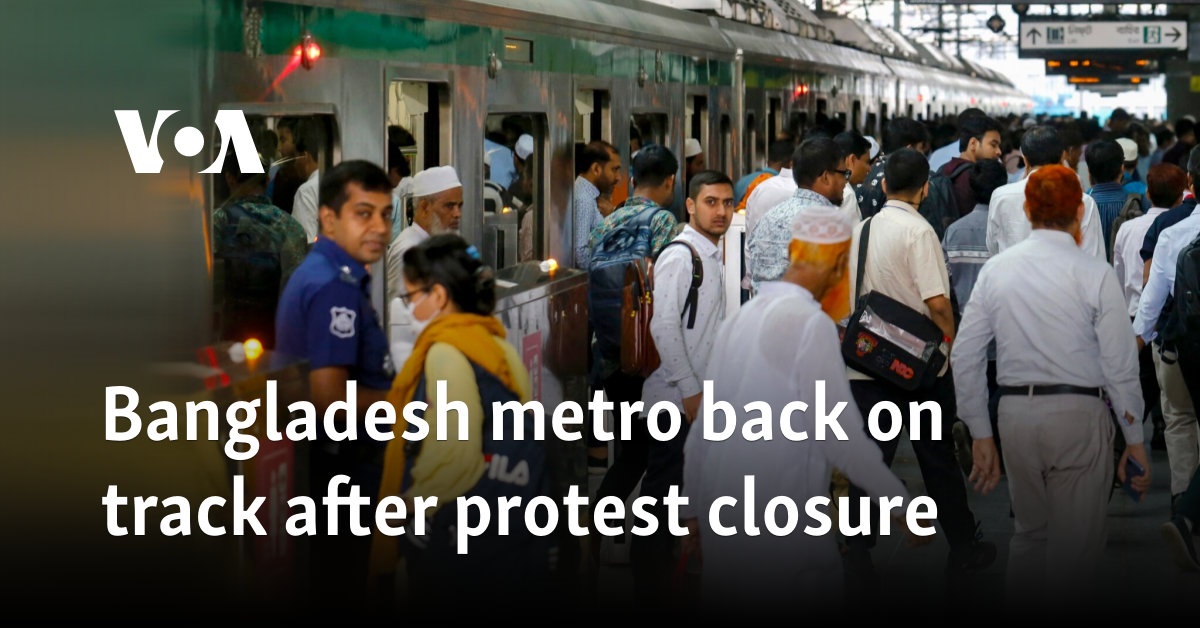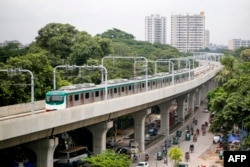The subway in Bangladesh’s notoriously congested capital, Dhaka, resumed operations on Sunday, more than a month after it was closed at the height of student protests that ultimately led to the ouster of the prime minister.
Political unrest has continued in much of the crisis-ridden South Asian country since the revolution that overthrew Sheikh Hasina and ended her 15-year iron-fisted rule, but on Sunday at least the trains were back on the tracks.
Dhaka is one of the most densely populated cities in the world and the railway is a vital transport link in this sprawling megacity of around 20 million people.
Banker Shaheen Sultana said she was pleased that her commute to work was a “relaxed” affair after weeks of traffic jams on the roads.
“I’m very happy that it’s working again,” said Sultana, 40, as she left a station near her workplace in the city’s business center. “It’s a big relief.”
During the student protests, the elevated railway network was closed in mid-July.
During the deadly violence, which left hundreds of people dead before Hasina resigned on August 5 and fled the country by helicopter, the broadcasters were vandalised by a mob.
Return to normality
The resumption of subway operations is an important sign of a return to normal everyday life.
The reopening was ordered by the new transitional government led by 84-year-old Nobel Peace Prize winner Muhammad Yunus.
“Since there was no subway, I had to take the bus to work,” said Kaosar Khan, a speech therapist at a private hospital in the city.
“I had to deal with massive traffic congestion,” added 25-year-old Khan. “It used to take me two hours to get there by bus, but with the subway I can reach my destination in 15 minutes.”
Hasina’s government has been accused of widespread abuses of power, including the mass arrest and extrajudicial execution of political opponents.
But the Dhaka Metro, which will be inaugurated in 2022, is seen by many as one of the most significant infrastructure projects during Hasina’s otherwise gloomy tenure.
It was an instant success in the crowded city, where commuting by road is a source of great frustration.
“Why harm the nation?”
According to local researchers, the capital’s economy loses over three billion dollars in working time each year due to traffic congestion, which is often made worse by regular street protests and monsoon rains.
Pictures released by Hasina’s office during her term in office show her crying at the sight of a devastated subway station in a suburb of Dhaka.
Hasina had described the line as a “matter of great pride” when it opened in December 2022 and was angry that it had been attacked during the protests.
“Who benefits from this… Do I take the subway?” she asked at the time.
Others said Hasina’s government had used the attack on the subway to close it as a warning.
“They wanted to say that if you oppose us, you will have to face the consequences,” said Mohammad Hridoy, 28, a technician waiting on the platform.
“The closure appeared to be deliberate rather than necessary due to circumstances.”
Some passengers said on Sunday that the attack on the subway was a stain on the reputation of the demonstrators.
“Why harm the nation and destroy public property?” says Sharmin Sultana, 55, a housewife travelling with her young daughter and wearing a yellow headscarf.
“We should protect our public property, regardless of party political considerations.”


